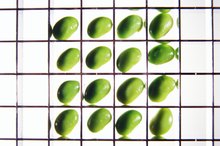The Benefits and Drawbacks of Soy Protein Powder in Women
Soy protein powder is a common source of plant-based protein used in many weight loss and sports nutrition supplements. Soy’s effects on women have been extensively studied due to soy’s estrogen-like compounds called isoflavones. Choosing soy over other types of protein may provide certain health benefits.
Background
Soy is the only plant-based protein source that provides the body with all essential amino acids, making it a complete protein. For this reason, soy is an excellent choice for vegetarian and vegan women. Soy protein powder is commonly added to milk, water or juice to make protein shakes or smoothies.
Cholesterol
Soy and Hormonal Imbalance
Learn More
Consuming soy on a daily basis may help improve women's cholesterol levels. According to the National Center for Complimentary and Alternative Medicine, daily soy intake may slightly improve LDL or bad cholesterol levels, which could reduce your heart disease risks. A 2011 review article published in “Frontiers in Bioscience” also found that consuming soy isoflavones can slightly decrease LDL cholesterol levels.
Menopause
Some studies show that soy consumption can help relieve symptoms of menopause, due to soy isoflavones, or phytoestrogens. The same 2011 article published in “Frontiers in Bioscience” reports that soy isoflavones can moderately help improve symptoms such as hot flashes and loss of bone mineral density related to menopause.
Sports Nutrition
Benefits of Soy Protein for Breast Growth
Learn More
Soy protein powder is often used as an ergogenic aid for athletes, to help improve athletic performance and aid in muscle recovery. According to the American Dietetic Association, consuming soy protein can help with muscle maintenance, synthesis and repair in response to training.
Drawbacks
Although consuming soy protein powder may provide some benefits for women, a regular intake of soy isoflavones found in soy protein powder could pose some risks as well. According to the National Center for Complimentary and Alternative Medicine, the safety of consuming soy isoflavone supplements over a long-term basis is unknown, and some studies indicate an increased risk for endometrial hyperplasia in women, which could lead to cancer.
Related Articles
References
Writer Bio
Erin Coleman is a registered and licensed dietitian. She also holds a Bachelor of Science in dietetics and has extensive experience working as a health writer and health educator. Her articles are published on various health, nutrition and fitness websites.









